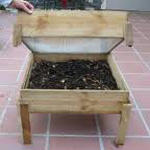Zero Organic Kitchen Waste

In our kitchen we produce a fair amount of organic waste. When we make our smoothies there are peels and seeds. When we prepare for stir fries, there are always some cut offs. Be it the greens of carrots or beets, some wilted or brown leaves from salads. Sometimes we don’t use some veggies or fruits in time and they go a little bit moldy. Then there are tea bags or skins from nuts or the table flowers are passed their time. So, what to do with all this? Is there a way to make this waste into a resource? Yes, there are a few.
If you have yard, you can set up a compost pile. The natural processes eventually turn your kitchen waste into compost. Similar you can set up a compost bin. Sometimes you can get this from the city that try to reduce the waste that goes into the landfills or you can buy one. Some of them can be rotated, which speeds up the composting process.
Another option I have never tried but heard works quite well, is to put your organic kitchen scraps into a blender, mix it all up use it as a liquid fertilizer on your plants.
Both previous methods might cause various issue if you add milk products or any kind of meat. Don’t add this to the liquifying ideas nor put them to the compost, as this will attract animals. In our household we make sure that milk products or meats never go bad and are always eaten. Same thing with cooked food. We never let that go to waste. It sounds hard, but once yo have figured out how much you need to cook and use left overs for lunches or for the next meal, it is quite easy.
Ok, now what do you do in areas where it gets cold and freezes? The compost system still can work. Put a lid on the compost pile and just toss it in. When it gets warmer add some soil, leaves, straw, etc. But there is another option. Compost worms! They can live in the yard, but they can also live right under the kitchen sink or another shady, dark spot with easy access. A little bin with some soil, add the compost worms and your daily kitchen scraps and some sort of cover, like a water soaked thicker layer of newspapers. If the container has a drain, great. You need to check that the bin does not get too wet or too dry and that there is some food for the worms in there, otherwise they want to get out. Of course there are bins available in garden centers and nurseries. They are not really necessary. For several years, when I was living in and apartment, I had a small bin on the balcony. It worked great.
Using any of these methods yo are not only reducing your organic kitchen waste to zero and preventing it to go into the landfill, but actually producing valuable compost for use int he garden. A waste has become food for something else.
If we all would just not produce any organic waste, more than 34 million tons of food wasted each year, 14 percent of the total municipal solid waste stream, would become a resource.





I need a fantastic place to host my blog, do you know associated with a?
Cold you complete your questions so I can answer?
I just want to tell you that I am just all new to weblog and actually savored your web page. Very likely I’m want to bookmark your site . You actually come with terrific articles. Thanks a bunch for revealing your website page.
After I open up your Rss feed it appears to be to be a ton of nonsense, is the problem on my part?
I genuinely enjoy looking through on this website, it holds wonderful blog posts. “One should die proudly when it is no longer possible to live proudly.” by Friedrich Wilhelm Nietzsche.